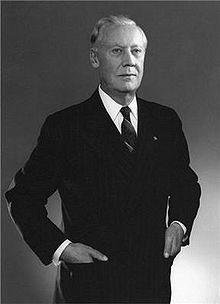Axel Wenner-Gren
Axel Lennart Wenner-Gren (* 5. June 1881 in Uddevalla , † 24. November 1961 in Stockholm ) was a Swedish large industrial .
Axel Wenner-Gren was the son of a farming family from Uddevalla. He studied in Germany and learned sales technology in the USA . Through his Viennese friend and partner Gustav Robert Paalen , Wenner-Gren recognized the importance of the electric vacuum cleaner early on , took a stake in its Berlin company Santo GmbH in 1910 and founded the Electrolux company for the production of household appliances in 1919 with its own patent for a house vacuum cleaner great style.
On December 14, 1909, he married in London Marguerite Gauntier Liggett (1891-1973), daughter of James Wesley Liggett and Ada J. Gauntier from Kansas City . She trained as an opera singer ( soprano ) in Berlin . The marriage remained childless. Marguerite was the sister of actress and screenwriter Gene Gauntier .
In 1939 Wenner-Gren resigned the chairmanship of his company and retired to the Bahamas , where he owned Hog Island , now known as Paradise Island . He was the main owner of the company until 1956, when he sold his shares to the Swedish Wallenberg Group . From 1934 to 1941 he was also a co-owner of Svenska Cellulosa AB and he was also significantly involved in the armaments company Bofors . There were also lucrative companies in Canada , South America and Mexico .
During the Second World War he fell into disrepute in the USA for being friends with Hermann Göring , he was put on the list of collaborators , his fortune worth millions was confiscated and every American citizen was forbidden from doing any business with “Nazi Sweden”. Wenner-Gren, however, had never been a collaborator, but had worked to prevent war. For this he used his good connections to circles of high finance and to politicians in England and Germany.
After the war he managed to do business with the Americans again after the Truman government lifted the ban on him. To achieve this, Wenner-Gren secured the support of leading politicians, including Senator John Hastings from Los Angeles . It was also Hastings who gave the impetus for the development of a monorail , the later " Alweg-Bahn ", in order to solve the traffic problem of his city. The technically interested Axel Wenner-Gren supported the project financially and gave the promising path his name: A xel L ennart We nner- G reindeer.
Wenner-Gren donated large sums to various cultural and scientific purposes, including the Wenner-Gren Institute in Stockholm and the Wenner-Gren Foundation for Anthropological Research in New York . The Wenner-Gren Center in Stockholm was donated by him and named after him.
literature
- Axel Wenner-Gren , in: Internationales Biographisches Archiv 05/1962 from January 22, 1962, in the Munzinger archive ( beginning of article freely available)
- Tomorrow's business , in: Der Spiegel , No. 3 from 1956, pp. 16–23
Web links
- Wenner-Gren Foundation
- Newspaper article about Axel Wenner-Gren in the press kit of the 20th century of the ZBW - Leibniz Information Center for Economics .
| personal data | |
|---|---|
| SURNAME | Wenner-Gren, Axel |
| ALTERNATIVE NAMES | Wenner-Gren, Axel Lennart (full name) |
| BRIEF DESCRIPTION | Swedish industrialist |
| DATE OF BIRTH | June 5, 1881 |
| PLACE OF BIRTH | Uddevalla |
| DATE OF DEATH | November 24, 1961 |
| Place of death | Stockholm |


